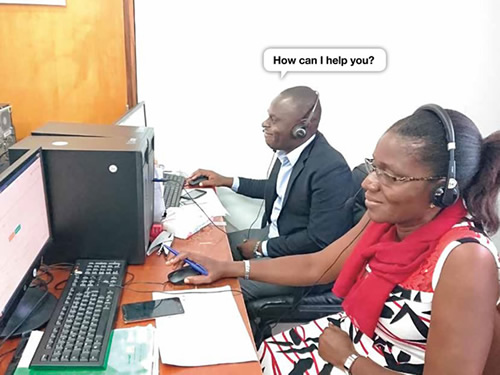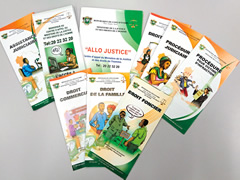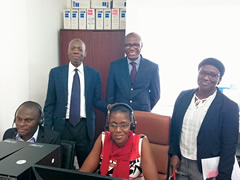Feature
Ensuring Basic Human Rights
Developing Legal and Judicial Systems to Protect Rights
[Case 2] Call Centers: Helping People to Access the Legal and Judicial Systems

Operators take calls every day from people seeking legal information. Anaman (at rear).
A call center to help resolve day-to-day disputes among people is drawing much attention in Côte d'Ivoire
Brochures explaining the role of the call center

Brochures were prepared when the call center was opened to provide legal and judicial information.

The call center is run by five people. It is headed by the Director of the Civil and Criminal Affairs Bureau, with operators being overseen by a supervisor.
Increasing Attentions to Access to Justice
Even once laws and the judicial system have been established, people still feel disempowered by not having access to legal information, not knowing where to find such services, or not having the financial wherewithal to do anything. Put simply, people have no real access to appropriate dispute resolution. This issue of lack of access to justice is drawing international attention and therefore one of the targets of the UN's Sustainable Development Goals (SDGs) is to "provide access to justice for all."
Given this background, JICA launched its Enhanced Access to Justice training program. Trainees from various countries have participated in the program. The training introduces the participants to Japan's legal system and its various organizations, such as the bar association, which work to enhance access to justice, and provides some historical background regarding the Japan Legal Support Center (Houterasu) established in 2006. In this program, the participants can also observe firsthand in this program a call center which provides people with easy access to legal information over the phone. After the training, many participants express a desire to establish such a call center in their home countries.
The First to Establish Call Centers
Côte d'Ivoire is one country that has already established a call center. Its call center was established in 2017 with the support of a JICA legal advisor. The center is run solely by the Ministry of Justice, and refers callers seeking legal information to appropriate local entities. "I had a call about a land transaction from someone in a town 580 km from Abidjan where the call center is located, and referred them to an appropriate local organization. Regardless of distance, communicating over the phone allows me to provide callers with the appropriate information," says operator Anaman Adjabe Filmin, explaining the merits of the call center.
Citizens started to understand they could obtain information by contacting a call center. This information is proving useful in resolving legal problems and the number of calls is increasing. "We plan on increasing the number of operators to accommodate the increasing number of calls.
As people become more familiar with the law, we expect them to gain a deeper understanding of how it can protect their lives," says Giro Kruma Sabore, who serves as deputy director of the Civil and Criminal Affairs Bureau.
With a desire to further enhance access to justice, Giro attended JICA's Enhanced Access to Justice training program in 2019. She visited a Japanese call center, and in addition to gaining valuable insight for improving the call center in her own country, she was inspired to introduce some assistance programs such as subsidizing legal consultation fees and court costs.
Giro is often asked by the fellow participants from other countries how to introduce a call center. "I really want to help improve access to justice in other countries as well," she says. JICA is currently organizing surveys to explore the possibility of supporting the establishment of such call centers in other countries.




scroll